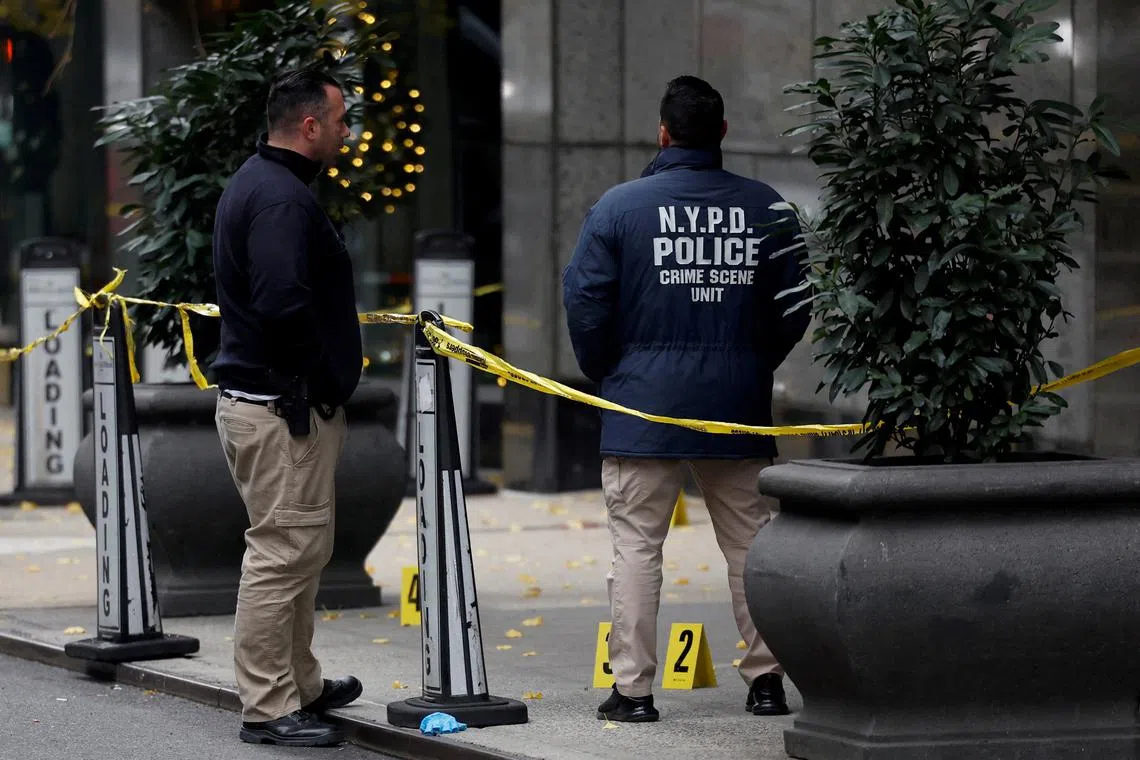US companies spending record amounts to protect executives as threats rise
Sign up now: Get ST's newsletters delivered to your inbox

Tech companies had the biggest growth in implementing security measures for executives.
PHOTO: REUTERS
Follow topic:
NEW YORK - US companies are spending record amounts to keep their executives safe in response to rising threats and the killings of two high-profile corporate officials in separate attacks in Manhattan over the last eight months.
Corporations have doubled the number of plain-clothed security teams outside buildings in New York City since a shooting last week in which four people were killed, said Mr Glen Kucera, president of the enhanced protection services unit at Allied Universal, a security and facilities services firm.
“It’s unspeakable. I never knew anyone who was murdered,” said Mr Rich Friedman, chairman of Goldman Sachs Asset Management, who previously worked with one of the victims, Blackstone executive Wesley LePatner.
Her death shook Wall Street, even though authorities believe her killing was a random event. Police said the shooter was targeting the headquarters of the National Football League, which is housed in the same building
The shooter also killed a New York City police officer
The attack was “shocking and hits very close to home,” Citigroup spokesperson Ed Skyler said in a note to employees a day after the July 28 killings in Midtown.
“Understandably, yesterday has also left many of us feeling uneasy,” he said, assuring employees that the bank has beefed up security at its Manhattan headquarters over the last year.
Threats against executives “have massively ramped up since 2020,” said Mr Chris Pierson, the CEO of cybersecurity firm BlackCloak. He noted how the man charged with murdering a Minnesota lawmaker and her husband near Minneapolis in June allegedly kept a target list of mostly other politicians and used online people-search services to find their addresses.
Mr Ben Joelson, head of security risk and resilience for the Chertoff Group, a security advisory firm, said threats against executives are higher than at any time in the decade he has worked in the field, with social media posts magnifying complaints against institutional leaders.
Artificial intelligence is compounding the problem, leading to an “exponential rise” in realistic phishing attempts, Mr Joelson was cited as saying in a report by research firm Equilar.
When UnitedHealthcare CEO Brian Thompson was shot to death
“It’s increasingly acceptable for some bad actors or adversaries to address grievances through violence,” which has led many companies to put a new focus on security, Mr Joelson said.
Mr Matthew Dumpert, global leader of enterprise security risk management at financial and risk advisory firm Kroll, said a lot of existing and new clients reached out last week following the deadly attack in Midtown.
“Several of the outreaches directly to me have been by the executive committees... whoever owns risk. It’s chief legal officers, admin officers, compliance officers, security officers,” Mr Dumpert said.
He added that several clients that had emergency response projects slated to start later in 2025 have asked him to “put those on the front burner. Start immediately, and let’s move forward.”
‘Trend is unsurprising’
Median spending on executive security for top officers including chief executives, chief financial officers and others rose 16 per cent to a record US$106,530 (S$137,000) in 2024, according to new data from Equilar, which reviewed financial filings for the 500 largest US public companies by revenue.
Security spending includes surveillance and alarm systems for executives’ homes, personal guards and cybersecurity protections. Equilar analysts said the trend is likely to continue as firms grapple with the growing threats to their executives and employees.
The percentage of executives at those companies with such protection rose to 33.8 per cent from 23.3 per cent over the 2020-2024 period, Equilar said.
Nearly a third of CEOs in the group, 32.4 per cent, received security services in 2024, up from 21.9 per cent in 2020; the value of those CEOs’ security perks reached a median US$77,976 in 2024, up from US$40,052 in 2020.
Tech companies had the biggest growth in implementing security measures for executives, with a 73.5 per cent jump in those receiving the benefits from 2020 to 2024, but communications companies spent the most, at a median value of US$1.2 million a year, Equilar found.
Blue-chip companies such as Walmart, General Motors, American Express, and chipmaker Broadcom, previously disclosed new or increased security expenses from previous years following Mr Thompson’s killing.
“The trend is unsurprising considering the broader concerns about executive safety amid geopolitical instability, increasing cyber threats and the high public visibility of top leadership roles,” Equilar said in its report. REUTERS

